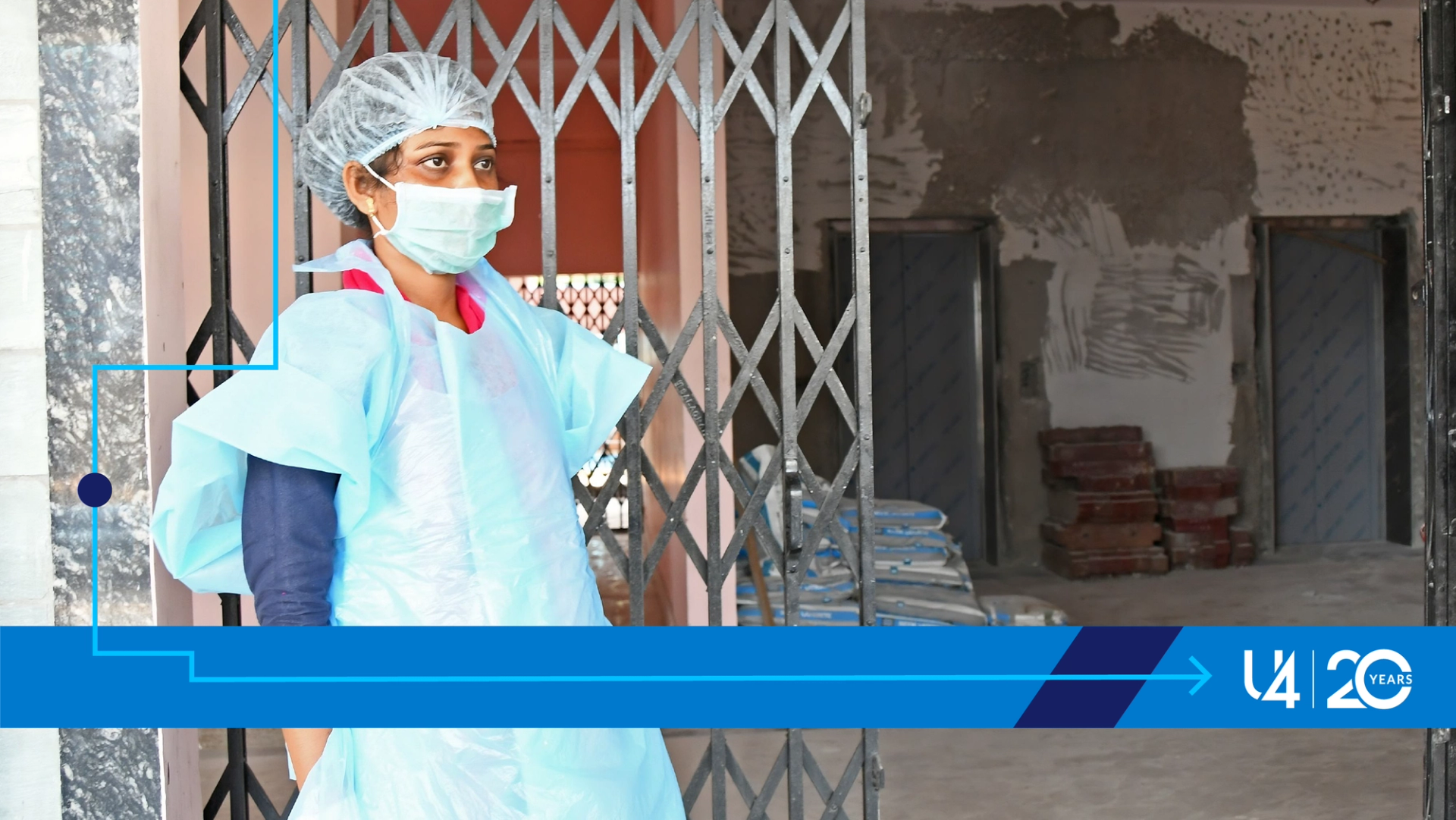Blog
Corruption is absent from the UN ‘World of Debt‘ report

Anniversary blog series
U4 staff and friends celebrate U4’s 20th anniversary with a blog series reflecting on developments and lessons learned in a world of ever evolving corruption challenges:
- U4 at 20: A quiet birthday at home with friends (across the world) – Peter Evans
- Specialised anti-corruption institutions: Measuring their performance and managing our expectations – Sofie Schütte
- The role of technology in anti-corruption: Dystopian reflections – Daniel Sejerøe Hausenkamph
- Strategic litigation and its untapped potential for anti-corruption – Sophie Lemaître
- The anti-corruption community should become more ‘tribal’ – David Jackson
- Corruption risk management in the aid sector: past, present, and the path ahead – Guillaume Nicaise
- Corruption is unaffordable for Latin America’s resurgent left: Democracy and lives are at stake – Aled Williams and Daniela Cepada Cuadrado
- Corruption is absent from the UN ‘World of Debt‘ report – Daniela Cepada Cuadrado
- Anti-corruption games: Learning how to face corruption challenges – Guillaume Nicaise and Rachael Tufft
- a) Gender and corruption: What we’ve learned from 20 years of research (Part 1) – Ortrun Merkle and Ina Kubbe
b) Gender and corruption: Charting the course for the next 20 years (Part 2) – Ortrun Merkle and Ina Kubbe
And other blogs to come throughout 2023!
Sign up to the U4 Newsletter to get updates, or follow us on Twitter | Linkedin | Facebook.
Alarm bells went off on 12 July 2023 when the UN released its latest report, A world of debt. Their findings were sobering, to say the least: global public debt reached an all-time high of US$92 trillion in 2022. Facing high interest rates, half of all developing nations now allocate at least 7.4% of their GDP to cover their external public debt obligations. This means less spending on essential public services. Today, 3.3 billion people live in countries that spend more on interest than on education or health.
The report lays out the number of people worldwide whose basic needs go unmet. But I was also shocked by something else. There was an ‘elephant in the room’ that the report failed to mention: how international financial institutions’ (IFIs’) repayment stipulations contribute to perpetuating poverty. The report was also silent on how IFIs and associated national austerity policies can engender more systemic corruption, which also contributes to exacerbating poverty and inequality.
I’d like to explore this further – particularly in terms of its impact on health systems and people’s well-being.
Austerity pressures do weaken health systems
The burden of interest rates on developing countries is enormous: the average rate at which African countries borrow, for example, is eight times higher than for countries like Germany. According to the UN report, 45 developing countries – most of which are in Africa, Asia, and Oceania – spend more on repaying interest on their debts than they do on health.
And interest rates are not the only problem. ‘Conditionalities’ imposed on countries by IFIs bring significant harm. Since the 1980s, the International Monetary Fund (IMF) has urged recipient countries to prioritise price stability (low inflation) and fiscal restraint (low budget deficits). As a consequence, we see heavily indebted countries with slashed ‘austerity’ budgets and chronic long-term underinvestment in key public services. For instance, IMF ‘structural adjustment reforms’ have been blamed for reducing access to healthcare in developing countries.
Austerity pressures have also come at particularly difficult times. During the Covid-19 pandemic the IMF recommended that Liberia slash its public sector employment funding by 17%, and that Malawi freeze spending on public sector wages. This, despite the fact that both countries already suffered from low ratios of health personnel: in Liberia, there were six nurses per 10,000 citizens; in Malawi, just four. The World Health Organization (WHO) recommends at least 30 per 10,000.
In 2020, ActionAid and Public Services International found that, since 2017, the IMF had advised every indebted low-income country to cut or freeze their public spending. This policy affected 24 out of 57 countries identified by the WHO as facing critical health worker shortages.
Corruption compounds the problems of austerity: Healthcare as a case study
Like austerity, corruption contributes to poorer health infrastructure and lowers the quality, equity, accessibility, and effectiveness of healthcare services. In many places, corruption prolonged the Covid-19 crisis. Cases of procurement corruption, vaccine queue-jumping, state capture, embezzlement, and mismanagement of funds flared across the world.
Austerity policies and corruption are more closely connected than they might seem. Here are three ways in which austerity policies enable corruption in the health sector:
1. By slashing public sector wages, austerity policies create incentives for health workers to engage in petty, sometimes functional, corruption
Austerity policies lead to underinvestment in public health, and poorer working conditions for the health workforce. During Covid-19, we saw health workers protesting over meagre salaries and delayed payments in Kenya, and over poor working conditions and salaries in Nigeria. This summer (2023), Nigerian doctors returned to the streets to demand better pay – their salaries have not increased in real terms since 2009. Meanwhile, the IMF has pressed Nigeria to cut its national budget by US$30.6 billion between 2022 and 2026, and required Kenya to freeze public sector wages for three years, as a condition of a US$2.3 billion loan package.
When health workers face chronic underpayment or sporadic payments, bribery can become a tool for supporting themselves and their families. To put it simply, accepting bribes may be the only way that health workers can survive.
2. Limited public spending lowers the supply of jobs, creating opportunities for corruption in recruitment
In countries where IFIs impose budget ceilings, governments recruit fewer staff into public services. This tends to result in more jobseekers chasing fewer vacancies – and some recruiters may take advantage. Public recruitment in the health sector is no exception. A 2022 academic study in Uganda found cases where officials engaged in patronage and clientelism, nepotism, cronyism, bribery, and extortion when recruiting and appointing health workers.
3. Austerity policies contribute to ‘brain drain’, exposing health workers to transnational forms of fraud, exploitation, and corruption
Faced with fewer opportunities and lower wages, many healthcare professionals consider migrating or emigrating. In fact, the WHO estimates that 15% of the global healthcare workforce practice outside their country of birth or first professional qualification.
Since transnational recruitment agencies are poorly regulated, moving abroad exposes health workers to serious vulnerabilities. Doctors and nurses can fall prey to fraudulent schemes and corrupt deals in trying to access foreign labour markets. When they find a job, they are also more likely to be exploited, as evidenced by several recent cases:
- Colombian and Mexican nurses were subject to long working hours; salaries that were half of local counterparts; and contracts with repayment clauses of up to 15,000 euros if they were to leave their employer.
- Zimbabwean care workers paid up to £4,000 (GBP; about US$5,000) for a certificate of sponsorship to move to the UK – in many cases to fraudulent agencies. Some Zimbabwean nationals running care agencies in the UK provided these certificates for free to family and friends: nepotism in its purest form. To top it off, several agencies withheld up to 50% of care workers’ salaries, sometimes leaving them with a net pay of £4 (about US$5) per hour.
- Similarly, Indian nurses in the UAE saw half of their salaries withheld by fraudulent recruitment agencies as ‘commission’ – along with their passports. This was the best-case scenario though – most nurses were scammed and left stranded in the UAE with no real job prospects.
What can be done?
The UN’s roadmap to address global debt challenges and achieve sustainable development includes:
- Making the system more inclusive by enhancing developing countries’ participation in the governance of the international financial architecture
- Providing greater liquidity in times of crisis
- Scaling up affordable long-term financing
- Tackling the high cost of debt and rising risk of debt distress
While these approaches are welcome, they are not sufficient. If we are serious about reducing poverty and inequality, we must consider how to tackle the drivers of corruption, alongside easing the pressures from external public debt obligations.
I have looked at the issue through a healthcare lens, to show that current lending approaches are doing more harm than good. I suspect similar patterns can be found in other public services. For instance, the UN report also recognises that more money going to repay debt has meant less money for education.
IFIs’ austerity policies have the potential to exacerbate corruption and contribute to weakening public services. In line with previous recommendations made by Amnesty International, it makes sense that donor governments and multilateral agencies consider the residual risks from austerity policies. Some recommendations include:
- Refraining from debt agreements that constrain governments’ ability to provide quality public services
- Ensuring lending agreements are transparent and subject to public scrutiny
- Providing safe reporting channels that allow whistleblowers to shed light on unethical practices or wrongdoing during the negotiation and implementation of lending agreements
These would all be good first steps in the right direction.
Disclaimer
All views in this text are the author(s)’, and may differ from the U4 partner agencies’ policies.
This work is licenced under a Creative Commons Attribution-NonCommercial-NoDerivatives 4.0 International licence (CC BY-NC-ND 4.0)


